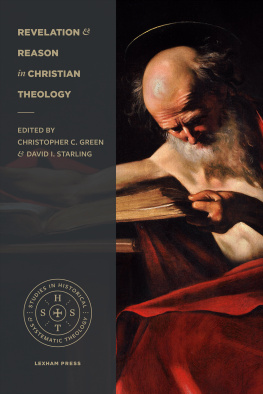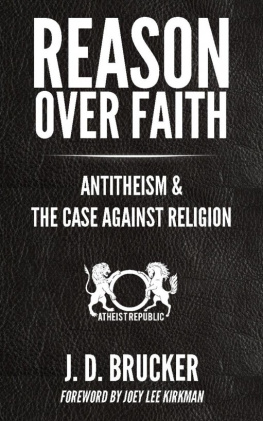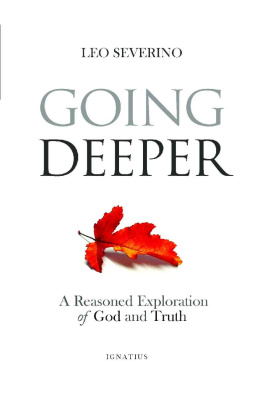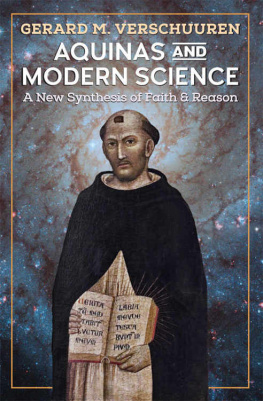Faith & Reason
The Cradle of Truth
Gerard M. Verschuuren
En Route Books and Media, LLC
5705 Rhodes Avenue
St. Louis, MO 63109
Cover credit: TJ Burdick
LCCN: 2017955136
Copyright 2017 Gerard M. Verschuuren
All rights reserved.
ISBN-10: 0-9991143-8-7
ISBN-13: 978-0-9991143-8-4
Table of Contents
Preface
Of course, its a travesty, but a very widely held one. We all have heard how some people caricature religious believers. On weekdays, they are critical, want proofs, look for arguments, and believe something only if there is no further doubt. Then, on Sundays, they turn a switch, set their understanding to zero and their gaze on infinity; they need no proofs, they open their mouths and swallow revealed truths and absurd dogmas. The contrast painted in this parody is clear: Religious believers live a schizophrenic life. It is the life of reason on weekdays and the life of faith on Sundays.
The underlying assumption is also clear: Reason is objective, scientific, and verifiable, while faith is subjective, personal, and irrational, even bordering on mania or madnessthey just cant go together. This perceived contrast cannot be true, though. It is based on distorted and shallow concepts of faith, reason, and the differences between the two, as we will see in this book.
On the one hand, we cant be asked to accept in faith what we cant understand, can we? God gave us brains and expects us to use them to understand even the mysteries of faith, to the extent such understanding is possible. So faith must have something to do with reason.
On the other hand, we cant be asked to put all faith aside either, can we? Reason itself depends on faith: faith in our senses, faith in our intellect, faith in our memories, and faith in what others have discovered. Besides, there is more to life than reason. Faith can cover issues that science and rationality are inherently incapable of addressing, but that are nevertheless entirely real. Seen this way, faith provides answers to questions that would otherwise be unanswerable. So reason must have something to do with faith.
This means that weekdays and Sundays cannot be disconnected from each other, as the caricature suggests. They should be in close harmonythe harmony of faith and reason. The Boston College philosopher Peter Kreeft uses the following analogy: Walking to the beach is like reason and swimming is like faith. You have to go to the place where you can swim before you can swim. And you have to go to the place where you can believe before you can believe. In other words, reason takes us to the water so we can swim in faith. But while swimming, every once in a while, we need to go back to the beach of reason to get our footing back. Thats the back-and-forth of faith and reason.
This reciprocal relationship between faith and reason has been a constant theme in Catholic intellectual history, and it explains why the Catholic intellectual tradition is so rich, strong and full, perhaps unlike anything else in the world. In his famous Regensburg address and elsewhere, Pope Benedict XVI stressed the perennial relevance of Pope John Paul IIs encyclical Fides et Ratio (Faith and Reason) and the need for Faith to purify Reason, and for Reason to purify Faith. The question is how to make this happen and why it has become necessary more than ever to stress their connection and mutual relevance. Let this book be your guide in answering the many questions you might have.
The Power of Reason
There is not one person who doesnt reason. In everyones life, there are numerous moments we do some kind of reasoning. We decide to go to the store in the morning because we have an appointment somewhere else in the afternoon. It may not be a sophisticated kind of reasoning, but it is based on the reasonable assumption that we cannot be at two different places at the same time. Sometimes, we reason in a much fancier way: each time we are exposed to someones sneezing, we develop cold-like symptoms, so we come to the conclusion we should shun sneezers or take medication. Or take this one: individuals left to themselves cannot realize all the good things they might otherwise obtain, therefore they must live and work with others. That was the way of reasoning of a famous philosopher, Aristotle.
As a matter of fact, each time we engage in a discussion or dispute, we use reasoning to defend our position or to explain why we disagree with the position of others. Each time we look for any kind of explanation, we are in search of some form of reasoning. Aristotle once came up with the following line of reasoning: since it is the interposition of the earth that causes a lunar eclipse, the form of this line will be caused by the form of the earths surface, which is therefore sphericaland not flat ( On the Heavens , Book II, Chapter 14). Thanks to reasoning, he was far ahead of his time without any fancy research. Thats just another simple example of what reasoning can do for us.
a. Our Reasonable Nature
Given our nature of reasoning, it makes sense then that we categorize one another as members of the species Homo sapiens where sapiens stands for wise or intelligent. More specifically, St. Thomas Aquinas calls a human being animal rationale a term that more accurately defines us as animals that use reason [ ratio ]. Rationality is our hall mark. Our capacity for reasoning sets us apart from the rest of the animal world. Pope John Paul II, in his Encyclical Fides et Ratio (Faith and Reason, 64), went even as far as saying, the human being is by nature a philosopher.
Rationality is our capacity to make rational judgements and decisions (which does not mean, of course, we always think rationally!). In fact, it is rationality that gives us access to the world of truths and untruthsa world beyond our control. Rationality is our capacity for abstract thinking and having reasons for our thoughts, thus giving us access to the unseen world of thoughts, laws, and truths. We peer further back in time, and further into the future, than any other animal. No other species would ever think to ponder the age of the Universe, or how it will end. Weighing evidence and coming to a conclusion are rational activities par excellence. Reasoning leads us from one idea to a related idea; it is a matter of pondering realities beyond that which we experience through our physical senses, thus allowing us to transcend the current situation through the mental power of reasoning. It is our gateway to truth.
Philosophical giants such as Aristotle and St. Thomas Aquinas would put it this way: all we know about the world comes through our physical senses but is then processed by the immaterial intellect that extracts from sensory experiences that which is intelligible . Well, it is the rationality of our intellect that makes the world intelligible and understandable; it gives us the power to comprehend the Universe through reasoning and to discover truths about this world. It is the minds rationality that gives us access to the laws of nature and the structure of this Universe. Without rationality, we would not even know there are laws of nature. However, laws of nature have to be discovered, they are not invented; they are not just mental creations but must be anchored in reality and truth. Reason helps us to discover them.
The power of reasoning is uniquely human. Rationality does not exist in the rest of the animal worldin spite of contrary claims made by many evolutionists who believe that rationality came to us through genes developed in the course of evolution. So from now on, I will use the word animal only for nonhuman animals, for there is a deep divide between the two. Animals may be intelligent to a certain degree, but they certainly are not rational, reasoning beings. True, pets sometimes outsmart their owners when they play a whole repertoire of tricks on their owners emotionsbut that is a matter of intelligence at best, not intellect. When a dog avoids another dog that it was bitten by before, it does so because a material causea bitemakes the dog do so. It is a result of conditioning, not reasoning.










